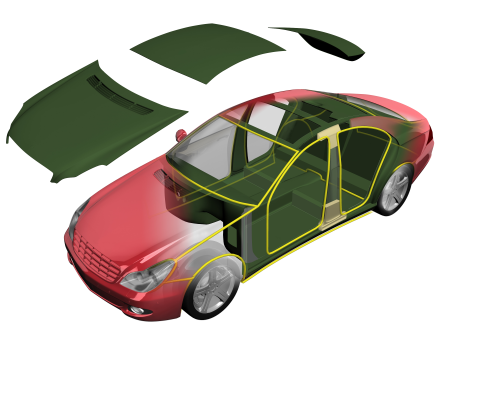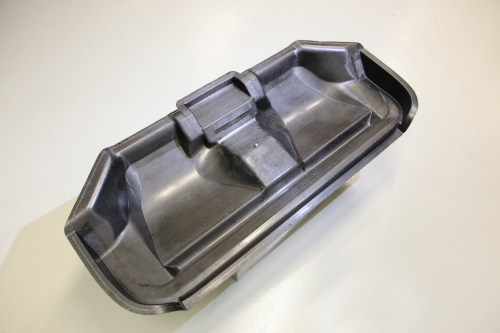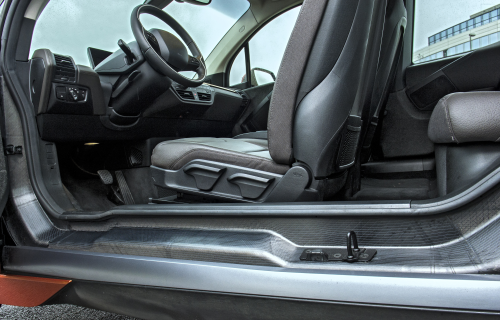



Part 1 of Reinforced Plastics' report on some recent developments in composites for automotives.
Dow Automotive
Dow Automotive has launched VORAFORCE 5300 ultra-fast epoxy resin for structural composite parts in mass production. The new resin offers 90-second cycle times, which support faster, more affordable light weighting and potential for parts consolidation. This makes RTM-produced carbon fibre composites suitable for mass production, says the company.
Dow Automotive adds that VORAFORCE 5300 extends RTM process capability via an extremely low viscosity for fast injection, with good wetting of the fibre pre-form. Further, the formulation is equipped with an internal release mould package, minimising external mould release costs. The benefits of VORAFORCE 5300 are claimed to extend beyond ultra-fast cycle times. Besides the material’s competitive mechanical properties, it allows for substantial parts consolidation. Customers can integrate many different parts into one production step, saving extra production and assembly operation costs. This can make composites an economically attractive solution over traditional metal alternatives. VORAFORCE™ 5300 is classified as non-toxic according REACH 2015 and the VDA-278 test shows volatile emissions are close to zero, an important factor for applications adjacent to the vehicle passenger compartment. These key benefits – fast cycle times and part consolidation potential – contribute to make composite solutions a true lightweight technology fit for mass production of hundreds of thousands of parts per year from a single RTM press, explains Dow Automotive. Further lightweighting developments from Dow Automotive include BETAFORCE™ structural adhesives that have been optimised for BMW i3 production. The adhesives enable a complete carbon fibre body-in-white. While composites are gaining traction in automotive production due to their weight-saving potential, they remain difficult to join. Adhesives offer a reliable alternative to traditional mechanical and thermal processes, which cannot be applied to these lightweight materials. Dow Automotive adds that these bonding solutions such as BETAFORCE™ enable a continuous bond line and cohesive joining of surfaces. Recent formulations of this adhesive offer a cycle time of around one minute and are currently being used for mass series production. Open times can be adjusted to accommodate specific mounting requirements in the plant, such as a quicker curing time by infrared treatment. Further, the initial adhesion requires no additional fixing tools.
Owens Corning
Owens Corning has introduced a new multi-end roving designed for epoxy sheet moulding compound (SMC) systems in automotive applications. In combination with epoxy sheet moulding compound (SMC) systems, Owens Corning says that the new ME1510 glass reinforcement enables improved mechanical properties. ME1510 features superior strength and flexural modulus, fast impregnation and good process characteristics in SMC, allowing up to 63% glass fibre content. Owens Corning adds that taking weight out of cars is required to enable meeting CO2 emission regulations and fuel economy standards. In combination with the epoxy resin system, the ME1510 solution is claimed to provide the opportunity for significant part weight reduction compared to steel. Furthermore, the SMC process technology provides the right balance between moulding cycle times, design freedom (allowing for function integration), and high mechanical properties, adds the company. The automotive market is expected to grow to 100 million new vehicles per year by 2020. With increased regulatory constraints in Europe, North America, and Asia, matching CO2 emission regulations and fuel economy standards are key drivers for weight reduction initiatives. A 200-300 kg weight reduction will be required to meet the CO2 emission targets set for Europe in 2020, i.e., 95g CO2/km. Along with engine and transmission improvements, Owens Corning adds that the replacement of traditional materials with lightweight and durable composite materials represents one of the most significant opportunities for vehicle light weighting. Composites allow for enhanced function integration compared to metal and will lead to further weight reduction opportunities in the medium to long term, in structural applications such as floor systems, pillars, roof and door modules, bumper beams, and seat structures.
Arkema
Arkema has launched its first range of liquid thermoplastic resins, Elium®, which is transformed using the same processes as composite thermosets. The resins are lightweight, cost-effective and recyclable. Arkema adds that Elium® resins polymerise quickly and can be used to design structural parts as well as aesthetic elements in a number of automotive applications, as well as other industries. According to Arkema, Elium® resins are multifunctional, lightweight, easy-to-use in manufacturing and offer high-performance. They are based on conventional technologies and processes that processors are already using. The company claims that composite parts made from Elium® are 30-50% lighter than the same parts made from steel, but offer the same resistance. When combined with Arkema Luperox® peroxide initiators, Elium® can be moulded into complex design forms for composite parts and blends well with glass or carbon fibres. It is also compatible with conventional thermosetting resin transformation technologies (Resin Transfer Moulding, Infusion and Flex-moulding), which cuts down the costs of transformers. Elium® is designed for high-performance parts that are recyclable and easy to thermoform, says Arkema. Unlike unsaturated polyesters, Elium® resins do not contain styrene. And because of their thermoplastic properties, they can be used to design composite parts that are easily thermoformed and recyclable with comparable mechanical performance to epoxy parts. Parts made from Elium® can be assembled by welding and/or gluing. Parts made from Elium® are also claimed to cost less to manufacture than other thermoplastic technologies. Arkema says that Elium® technology reduces the cost of long staple thermoplastic composite parts. Three compelling factors contribute to its cost-effective advantage: the resins are easy-to-use in conventional thermoset resin processes, it transforms at room temperature and it does not contain any fabricated products like organo-sheets.
Read Part 2
This article was published in the May/June 2014 issue of Reinforced Plastics magazine.
The digital edition of Reinforced Plastics is distributed free of charge to readers who meet our qualifying criteria. You can apply to receive your free copy by completing this short registration form.





